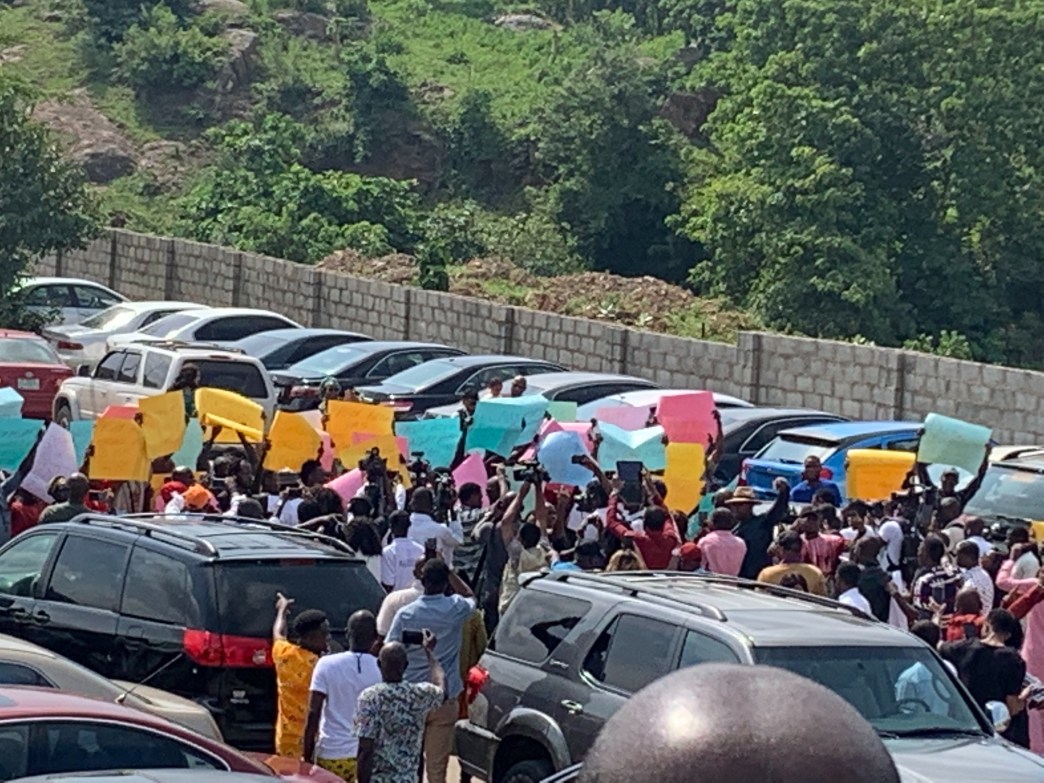Rape Scandal: Protesters demand COZA pastor, Biodun Fatoyinbo’s resignationRape Scandal: Protesters demand COZA pastor, Biodun Fatoyinbo’s resignation
A largely peaceful protest was held outside the Commonwealth of Zion Assembly (COZA) in Abuja on Sunday to force immediate resignation of Biodun Fatoyinbo as the lead preacher of the Pentecostal congregation.
The protest of about 300 people started at about 8:30 a.m. at the COZA headquarters in Abuja. It was amongst the responses to the raging allegations of rape involving Mr Fatoyinbo.
The demonstrators, largely women, dressed in white T-shirts and carried placards bearing a variety of condemnations of rape against Mr Fatoyinbo. They also used black sellotape to gag themselves in an apparent reverence to victims of rape and other violent sexual encounters.
Although Mr Fatoyinbo had faced previous accusations of inappropriate sexual behaviour, protesters told PREMIUM TIMES they were more enraged by the recent claims of Busola Dakolo, a mother of three who has been married to musician Timi Dakolo.
Mrs Dakolo said she was raped at 16 by Mr Fatoyinbo at her family home in Ilorin, Kwara State. The incident appeared to have occurred between the late 1990s and early 2000s — when she saw Mr Fatoyinbo as a mentor while he was trying to cut his teeth as a shrewd pentecostal preacher.
“This is a personal matter for me,” Olatunji Olarewaju, one of the protesters, told PREMIUM TIMES as the crowd moved towards the church at about 9:00 a.m. “This is a matter that borders not just on moral but criminal tendencies.”
Many of those who attended the sit-in outside the COZA Abuja, the largest of the church’s five branches across the country, found personal connections in Mrs Dakolo’s story and shared in her ordeal.
A simultaneous protest to demand Mr Fatoyinbo’s resignation held at the church’s branch in Lagos on Sunday morning.
The scandal was seen as merely another episode of systemic abuse of women and children in the country, a deplorable act that has continued with little government capacity to address.
Abuse has been particularly rife in schools and worship centres, places parents and young children normally expected to be safe for both the girl child and adult female. Several Nigerian academics have faced severe backlash and dismissal after being caught making unwanted sexual advances towards women, and many young women have alleged rape by their schoolteachers and lecturers.

“I have two daughters, I cannot imagine them going through what Busola Dakolo narrated about Biodun Fatoyinbo,” Ayobami Oyalowo, a supporter of Nigeria’s ruling party, APC, said. “This man has to go.”
Mr Oyalowo said he had been dismissive of the calls for additional investigation by authorities into Mr Fatoyinbo’s role, if at all, because the preacher was not a stranger to such allegations.
In 2013, Mr Fatoyinbo was accused by a broadcaster, Ese Walters, who said he had unwanted sexual encounter with her despite being married to his wife, Omodele, for many years. Another woman has also posted allegations of adultery against Mr Fatoyinbo on social media.
Although Ms Walters allegation defined the headlines and social media discussions at the time, Mr Fatoyinbo declined to address it. Ms Walters has been reluctant to speak about her encounter with Mr Fatoyinbo against the backdrop of Mrs Dakolo’s allegations, telling PREMIUM TIMES she did not “have anything to say.”
Many of the protesters said the allegations against Mr Fatoyinbo, coming from different women over years, have exposed him as unscrupulous and unfit to lead such a large congregation — which sees tens of thousands worshippers every Sunday.
“We will not stop demanding for him to step,” Mr Oyalowo added. “We are taking this protest to the Ministry of Justice, the Force Headquarters and everywhere else necessary until something is done to remove Mr Fatoyinbo as the leader of the church.”
A female protester who said she had once been raped by a mentor (not Mr Fatoyinbo) told PREMIUM TIMES her experience has continued to flash in her memory, despite being more than 13 years already.
The police have declined to commence an investigation into the allegations, telling PREMIUM TIMES on Saturday that they would require a formal complaint from the Dakolos and other alleged victims of Mr Fatoyinbo before they could proceed with any criminal probe.
Rape is a criminal offence in Nigeria, and its investigation is not statute-barred. Mrs Dakolo’s allegations could still force criminal charges against Mr Fatoyinbo, even though it occurred about two decades ago.
Most of the protesters interviewed by PREMIUM TIMES agreed with the police that the Dakolos should file criminal complaints against Mr Fatoyinbo.
Rights groups have launched nationwide coordination of all alleged victims of Mr Fatoyinbo, including those reluctant to be publicly identified. The groups are also threatening a class action lawsuit against the pastor, but the approach has been received with scepticism amidst concerns about Nigeria’s loose tort regulations.
Rape, not religion
Halima Bala, a Muslim woman, attended the protest in her burqa, telling PREMIUM TIMES the allegations against Mr Fatoyinbo, even though they have Christianity undertone, transcend religion divide.
“This is about the rape of a woman who was a minor when the incident occurred,” Ms Bala told PREMIUM TIMES. “I am a mother of two daughters and I can not sit a serious matter like this out.”
The protesters were held back a few metres from the church’s entrance by a joint-security team of the police, the State Security Service, the Civil Defence, military men and even regular members of the church security. The heavily armed officers arrived in several trucks and buses from their respective agencies.
Many of them sat on the asphalt for about two and a half hours, with regular but non-violent encounters with security personnel.
But a little over an hour into the protest, a group of suspected thugs convened at a nearby brick-processing factory to plan a counter-protest. They were coordinated by a man who was identified to PREMIUM TIMES as a COZA member.
The man, who wore a yellow dress, did not deny being a member of the church but told PREMIUM TIMES he had no explanation to give about whether or not he paid the group of about 40 people to launch a counter-protest.
He, was, however, seen holding a paper in which he wrote the names of the mostly northerners for the so-called protest. They tried to charge towards the crowd of anti-rape protesters at some point but beat a retreat after police intervention.
Abiola Akiyode-Afolabi, a pro-democracy campaigner who helped coordinate the protest, told the security agencies that they had the responsibility to protect the demonstrators against paid attackers.
She also told PREMIUM TIMES during the protest that they planned further demonstrations if Mr Fatoyinbo failed to step down from his leadership of COZA.
Earlier in the morning, two persons were driven away in a vehicle brought by one of the security agencies present at the protest. It was not immediately clear where the protesters were driven to, but witnesses told PREMIUM TIMES they were taken away a black Mercedes Benz C200.
It was not immediately clear whether they had been released as of Sunday afternoon.
‘Not even as an unbeliever’
Mr Fatoyinbo defied widespread expectation and showed up for Sunday service at about 10:00 a.m., during which he sermonised about the blessing of his church members.
The preacher had previously denied the allegations on Friday night, saying he would not rape any woman, ‘not even as an unbeliever’. He also threatened a lawsuit.
Mrs Fatoyinbo also defended her husband, using a passage from Second Samuel 22:1 to acknowledge that her husband has enemies but God would see him through the current challenges, the intensity of his enemies notwithstanding.
The pastor told his congregation that he had been having discussions with people he holds in highest regards, and the support he has received from members would make him continue to be a member of the church even if he is not its leader.
Members of the church, who turned out heavily for today’s service despite the scandal, showed immense solidarity towards Mr Fatoyinbo. Seven female congregants who spoke when the service commenced described the preacher as diligent and selfless.
Others told of how Mr Fatoyinbo intervened in their lives to a positive end and condemned allegations of rape against him as baseless and spurious.
A protester, Amara Nwankpa, however, said it was not a matter of whether Mr Fatoyinbo was a generous man towards women or not.
“It does not matter whether a man has helped 100 women in the past, rape is a criminal offence,” Mr Nwankpa, director of public policy initiative at Yar’Adua Centre, Abuja, told PREMIUM TIMES. “Hundred goods cannot justify a wrongdoing, especially when it a potentially criminal offence.”
Agenda meets moment
Nigerian Pentecostal movement has expanded significantly over the last three decades, with most of the country’s Christian population identifying with modern churches. Yet, accountability has remained a major challenge amongst Christian leaders.
Many of the large churches are run by the founder and carefully-selected board members who hardly stray far from the position of the founder. The board members hardly exercise any disciplinary control over the founder and are known instead to support any founder engulfed by allegations.
Although the Nigerian Constitution grants freedom of religion to citizens, calls have mounted in recent years for the government to exercise more regulation over churches in order to make them more accountable.
The calls have stemmed from growing instances of financial aggrandisement by some Pentecostal preachers, many of who live in luxury mansions and fly private jets in a country grappling with acute poverty and deprivation.
In 2016, the Nigerian government initiated a policy aimed at whittling down the influence of founding clerics over their churches. The Financial Reporting Council of Nigeria (FRCN) governance code sought to impose transparency, accountability and a standard for succession on non-governmental organisations, including Nigerian churches.
The policy was, however, abruptly shut down by President Muhammadu Buhari following a serious protest from Enoch Adeboye, the founder of the Redeemed Christian Church of God, a foremost Pentecostal movement in the country.
Jim Obazee, the head of FRCN at the time, was also summarily fired from office. The policy has not been revisited ever since.
The difficulty in finding a way to control the proliferation of churches and extract accountability from their leaders has been returned as a major topic of discussion in the wake of Mr Fatoyinbo’s latest sex scandal.
“But this is now the appropriate time for religious leaders to stand up and find a way of controlling their top personalities,” Segun Awosanya, a rights activist who has been amongst the coordinators of the campaign to oust Mr Fatoyinbo, told PREMIUM TIMES on Sunday.
The Christian Association of Nigeria (CAN) and the Pentecostal Fellowship of Nigeria (PFN) have declined to take any substantial position on the matter — and have in fact stayed away from the controversy.
“They no longer have a place to hide now,” Mr Awosanya said. “This is now the appropriate moment to implement the longtime agenda for a sort of regulatory oversight around the activities of pastors.”
In January 2018, another Pentecostal preacher, Suleiman Johnson (a.k.a.: Apostle Suleiman), was riddled with allegations of sexual misconduct levelled against him by Stephanie Otobo, a Nigerian woman based in Canada at the time. Mr Suleiman denied the allegations at the time, and Ms Otobo later made a so-called confession to discredit her own allegations, which were largely seen as too vivid to be made up by a large segment of the country.

